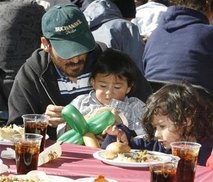|
.........
Starved for reform
OPINION
~~~~~~~~~~~~~~~~~~~~~~~~~~~~~~~~~~~~~~~~~~~~~~~~~~~~~~~~~~~~~~~~~~~~~~~~~~~~~~~~~~~~~
 |

CA needs to feed its poor |
|
Starved for reform
To get more funds from the U.S., and to feed more poor, California's food stamp program must change.
OPINION
June 25, 2010
California is poor these days, but not so poor that it can't take on the basic humanitarian responsibility of feeding the hungry. The federal government pays for food stamps plus half the administrative costs of the program. So it is inexcusable that Californians who were eligible for food stamps in 2007 — the most recent year for which figures are available — were less likely to receive them than residents of any state except Wyoming. |
| |
With so many people in want these days, we would expect the governor and Legislature to bring food stamp policies in line with those of other states — and the wishes of the U.S. Department of Agriculture, which oversees the program and has criticized states with low participation rates. Instead, California is the only state that requires food stamp recipients to be recertified every quarter instead of every six months, a rule considered to be a major obstacle in keeping qualified people enrolled. Switching to the six-month schedule would cost $20 million for computer work — a relative pittance.
Yet California is putting off the reform even though it will receive nearly $30 million extra this year from the federal government, its share of congressional aid to help states with the cost of administering food stamps. That money could have been spent on the switch, but the bill that would have mandated it died in committee, apparently because Gov. Arnold Schwarzenegger preferred to use the extra food stamp funding to free up more money in the general fund.
The attempt to squeeze every penny is understandable, but this is a heartless decision — and pound-foolish as well. The state would bring in billions of dollars in federal money for additional food stamps if more people participated. That money would bolster the state's economy when recipients make purchases in the state's supermarkets. And California would save money over the years by recertifying recipients half as often. Fraud is low in the foot stamp program, and states that have dropped quarterly recertification have not seen big increases in cheating.
The one-time $30-million allocation should have come with strings attached — any future allocations should require states to reach more of those who are qualified for the program. And Sacramento should take a page from the Los Angeles Unified School District, which does a particularly good job of using federal money to make sure that its hungry students — more than 530,000 qualify for free or reduced-price meals — get both breakfast and lunch. The district is already starting up its summer meals program, for children ages 1 to 18. As with food stamps, it is funded by the Department of Agriculture. Fortunately, the district realizes that feeding those in need should be a priority in hard times — especially when doing so doesn't cut into education programs. |
|
|
 |

|